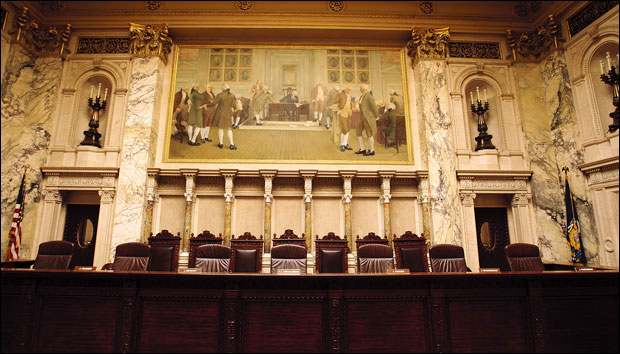State justices’ boycott reflects divided court
By: Jack Zemlicka, [email protected]//April 26, 2012//
State justices’ boycott reflects divided court
By: Jack Zemlicka, [email protected]//April 26, 2012//

A Wednesday afternoon boycott staged by four state justices enhanced the fractured image of the Supreme Court and could happen again if its leader doesn’t conform to a new protocol.
Fed up with what they saw as Chief Justice Shirley Abrahamson’s procedural disregard, Justice Patience Roggensack and three other members of the court refused to attend discussion on a proposal to limit the scope of issues discussed in open conference.
Abrahamson informed her colleagues before a lunch break Wednesday that she intended to put the proposal, authored by Roggensack, to a final vote when the court reconvened at 1:30 p.m.
But in an email to Abrahamson sent minutes before the start of the afternoon conference, Roggensack said the decision to limit open discussions to rules petitions had already been endorsed by the majority of the court in January and Abrahamson had no business revisiting the issue.
“I told her that this issue was already decided and asked her to issue an amended agenda,” Roggensack said. “She didn’t. She always does what she wants and when it’s something she doesn’t support, she ignores you.”
Abrahamson did not immediately return a call for comment.
Roggensack said she would consider another boycott if future agendas don’t reflect the earlier decision of the court. Her proposal to limit the scope of issues discussed in open conference to primarily rules petitions was designed to increase efficiency, she said.
Roggensack and Justices Michael Gableman, David Prosser and Annette Ziegler voted to adopt the proposal Jan. 17. The same four also boycotted the Wednesday discussion on the topic.
In their absence, Abrahamson proceeded with a final review of Roggensack’s proposal with only herself and Justices Ann Walsh Bradley and Patrick Crooks at the conference table.
The three justices dissented on the proposal to limit administrative conferences and collectively stated in the dissent that, “No good comes from secrecy in governmental affairs.”
The other four justices cast their votes in support of the proposal from their chambers.
“I was able to work on an opinion,” Roggensack said of her time during the boycott. “Frankly, I’m glad I didn’t go out there because I got a lot of work done.”
After resolution of the matter, the absent justices returned to the open conference to discuss pending rules petitions.
While the justices finished the afternoon without further incident, Marquette University Law School Professor Rick Esenberg said the boycott perpetuated the fractured image of the court.
“I think it reflects the rift among the justices and the way in which skirmishing can continue long after a battle has been fought and resolved,” he said, “In a collegial court, that type of thing has a tendency to reverberate past the immediate issue.”
The court has been divided in recent years by personal and ideological disputes. The tension came to a head in June when Prosser and Bradley had a physical altercation in Bradley’s chambers in front of four other justices. Bradley confronted Prosser in an attempt to get him to leave her office, and he put his hands on her neck in what he said was a defensive reflex.
Last month, the Wisconsin Judicial Commission alleged that Prosser’s action violated the ethics code for judges. Prosser is asking justices to recuse themselves because of their personal knowledge of the case. If four or more do so, the case would end.
After the incident, Abrahamson asked that the court increase transparency and deliberate cases in public. But the six other justices rejected that idea, and Roggensack countered with a proposal to take up certain administrative matters, such as discussing budgets and setting court policies, behind closed doors.
The court is scheduled to hold its next open administrative conference May 16 and Roggensack said she hoped that the agenda would contain only discussion of pending rules petitions.
If not, she said she would consider another boycott.
“If there is something else on it, we’ll have to get back to this again,” Roggensack said. “I would think the chief would honor the decision of the court.”
Legal News
- Former law enforcement praise state’s response brief in Steven Avery case
- Eric Toney announces re-election bid for Fond du Lac County District Attorney
- Former Wisconsin Democratic Rep. Peter Barca announces new bid for Congress
- Republicans file lawsuit challenging Evers’s partial vetoes to literacy bill
- More human remains believed those of missing woman wash up on Milwaukee Co. beach
- Vice President Harris returning to Wisconsin for third visit this year
- Wisconsin joins Feds, dozens of states to hold airlines accountable for bad behavior
- Trump ahead of Biden in new Marquette poll
- Bankruptcy court approves Milwaukee Marriott Downtown ‘business as usual’ motion
- New Crime Gun Intelligence Center to launch in Chicago
- Arrest warrant proposed for Minocqua Brewing owner who filed Lawsuit against Town of Minocqua
- Wisconsin Supreme Court justices question how much power Legislature should have
WLJ People
- Power 30 Personal Injury Attorneys – Russell Nicolet
- Power 30 Personal Injury Attorneys – Benjamin Nicolet
- Power 30 Personal Injury Attorneys – Dustin T. Woehl
- Power 30 Personal Injury Attorneys – Katherine Metzger
- Power 30 Personal Injury Attorneys – Joseph Ryan
- Power 30 Personal Injury Attorneys – James M. Ryan
- Power 30 Personal Injury Attorneys – Dana Wachs
- Power 30 Personal Injury Attorneys – Mark L. Thomsen
- Power 30 Personal Injury Attorneys – Matthew Lein
- Power 30 Personal Injury Attorneys – Jeffrey A. Pitman
- Power 30 Personal Injury Attorneys – William Pemberton
- Power 30 Personal Injury Attorneys – Howard S. Sicula











